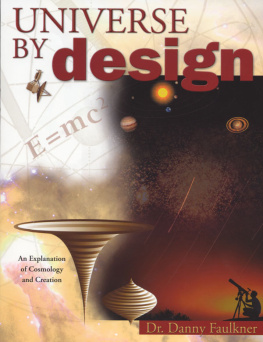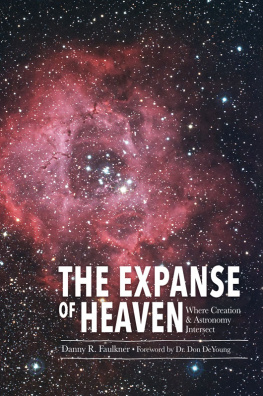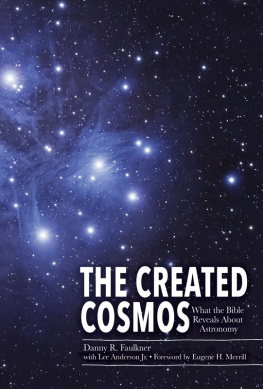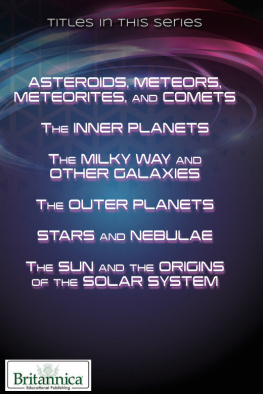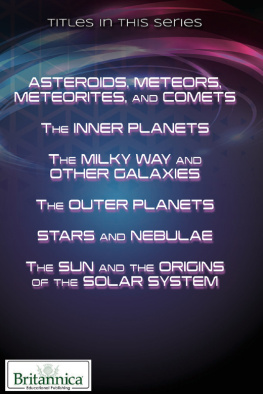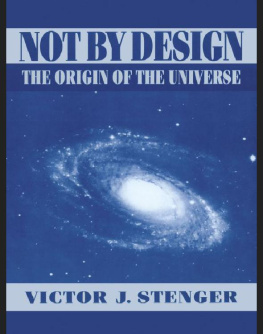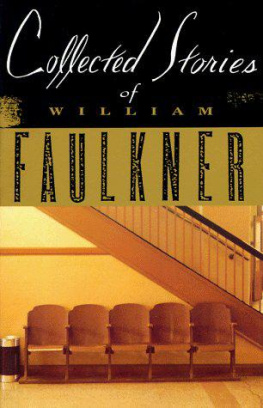Danny Faulkner - Universe by Design
Here you can read online Danny Faulkner - Universe by Design full text of the book (entire story) in english for free. Download pdf and epub, get meaning, cover and reviews about this ebook. publisher: Master Books, genre: Science fiction. Description of the work, (preface) as well as reviews are available. Best literature library LitArk.com created for fans of good reading and offers a wide selection of genres:
Romance novel
Science fiction
Adventure
Detective
Science
History
Home and family
Prose
Art
Politics
Computer
Non-fiction
Religion
Business
Children
Humor
Choose a favorite category and find really read worthwhile books. Enjoy immersion in the world of imagination, feel the emotions of the characters or learn something new for yourself, make an fascinating discovery.
- Book:Universe by Design
- Author:
- Publisher:Master Books
- Genre:
- Rating:5 / 5
- Favourites:Add to favourites
- Your mark:
- 100
- 1
- 2
- 3
- 4
- 5
Universe by Design: summary, description and annotation
We offer to read an annotation, description, summary or preface (depends on what the author of the book "Universe by Design" wrote himself). If you haven't found the necessary information about the book — write in the comments, we will try to find it.
Universe by Design — read online for free the complete book (whole text) full work
Below is the text of the book, divided by pages. System saving the place of the last page read, allows you to conveniently read the book "Universe by Design" online for free, without having to search again every time where you left off. Put a bookmark, and you can go to the page where you finished reading at any time.
Font size:
Interval:
Bookmark:

First printing: October 2004
Second printing: August 2006
Copyright 2004 by Master Books. All rights reserved. No part of this book may be used or reproduced in any manner whatsoever without written permission of the publisher, except in the case of brief quotations in articles and reviews.
Cover by Farewell Communications
Interior Design by Bryan Miller
For information write:
Master Books
P.O. Box 726, Green Forest, AR 72638
ISBN-13: 978-0-89051-415-3
ISBN-10: 0-89051-415-1
Library of Congress Catalog Number: 2004106967
Printed in the United States of America
Please visit our website for other great titles:
www.masterbooks.net
For information regarding author interviews, please contact the publicity department at (870) 438-5288
Photo and Illustration Credits
NASA: 5, 7, 20, 33, 44, 47, 54, 78, 79, 82, 83, 87, 88, 99, 110, 131
Bryan Miller: 9, 11, 12, 13, 16, 18, 21, 25, 27, 33, 37, 39, 40, 42, 60, 65, 68, 73, 89, 103, 111, 116, 119, 129
Corbis Stock Photography: 94, 108
Science Photo Library: 125
Dedication
To the late Roger L. St. Peter, one of the best friends and finest Christian men that I ever knew. This book would have been far better had he been able to help me with it.
Acknowledgments
I want to thank several people who read various versions of this book and offered many helpful suggestions. They are, in no particular order, Dr. Larry Vardiman, Mr. Steve Miller, Mr. Peter Mikula, Dr. John Morris, Dr Tom Greene, Dr. Ron Samec, Dr. Don DeYoung, Dr. John Hartnett, Mr. Andrew Kulikovsky, and Dr. Jason Lisle. I want to particularly thank John Morris and my good friend Ron Samec for encouraging me to write this book in the first place.
Table of Contents
INTRODUCTION
The first few chapters of the Bible describe what I, the author, believe to be the origin and early history of mankind, the earth, and the universe. Even a cursory reading of the Book of Genesis by anyone reasonably scientifically literate ought to result in awareness that the biblical and scientific stories of creation are markedly different. Not wanting to live in a fragmented world of the Bible on Sunday and science the rest of the week, most Christians develop some reconciliation of the two. Either this process results in a world view, or it is based upon an often tacit world view. For instance, one will usually attempt to reconcile the Bible to science or science to the Bible. It is important to understand what one believes in Genesis, because certain rules of biblical interpretation will be established here.
So, what assumptions do I make? I think that it is wrong to reconcile the Bible to science. In this book we will encounter many ideas that were once widely believed and thought beyond dispute, but were later shown to be wrong and were discarded. On the other hand, the Bible does not change. There are many today who interpret Genesis in terms of the latest scientific theories and even fads. If the history of science is any teacher, then we must conclude that many of these ideas eventually will be discarded. If we have staked out a position that Genesis teaches these ideas, then what is to become of Genesis when these ideas are abandoned? A great concern of mine is that many Christians have wedded the creation account of the Bible to the big-bang theory, the current scientific myth of the worlds creation. In a hundred years will anyone believe the big bang? If not, then what is to become of Genesis if we have tied it to the big bang?
Attempts to reconcile the Bible to modern science include, but are not limited to, the following: theistic evolution, progressive creation, the gap theory, the day-age theory, and the framework hypothesis. Theistic evolution is the belief that biological evolution, as understood by most scientists today, was Gods method of creation. Progressive creationists do not believe that different kinds of creatures evolved from other kinds, but instead think that God repeatedly intervened to instantaneously create new kinds of organisms throughout time. Extinctions then acted to eliminate many of those kinds of creatures. Thus theistic evolutionists and progressive creationists agree on when various organisms came into existence, but differ on how those organisms came into existence.
Both progressive creation and theistic evolution require vast periods of time, so some accommodation for the six days of the creation week must be made. The most common approach is the day-age theory, that is, that each of the days of the creation week were long periods of time. Some who reject both theistic evolution and progressive creation still feel compelled to allow for vast ages of millions or billions of years in the earths past. In an attempt to permit this, the gap theory is the belief that there was a long period of time between the first and second verses of Genesis chapter 1. Then the six literal days of the creation week commenced with the second verse. The gap theory appealed to many people who wanted to interpret the Bible as literally as possible, but the gap theory has increasingly fallen onto hard times with the rise of modern creation science.
In recent years the framework hypothesis has made large inroads among conservative Christians who take the Bible seriously. The framework hypothesis is the idea that the first ten chapters of Genesis are poetry, not history. As such, those chapters have rich meaning, but do not reflect actual history. In this view, the Bible is silent on the how and when of the origin of the world, and so the believer is free to adopt whatever modern science has to say about these questions. All of these accommodations of Genesis to modern science have difficulties, a topic that will not be further developed here.
What is the viewpoint of this book? The days of the creation week are best understood as literal days, not long periods of time. While the Bible does not tell us the date of creation, the strong implication is that the creation was only a few thousand years ago. There is a fairly complete chain of biblical chronologies from the creation to the time of Christ. Those chronologies add up to about 4,000 years. Adding the two millennia since the time of Christ, we determine an age of the world of about 6,000 years, though some understandings of the chronologies could stretch the age by nearly a thousand years. (Note that the precision of the Ussher chronology [4004 b.c. as the date of creation] is not possible.)
In any case, a faithful rendering of biblical chronologies will not allow for millions or billions of years for the age of the universe as demanded by modern science. Therefore, the approach that we take here is very different from the approach that nearly every other book on cosmology takes. At the time of the writing of this book, cosmologists generally estimate the age of the universe between 12 and 14 billion years. One particular study dated the age of the universe at 13.7 billion years, plus or minus 1%. We estimate the age at about 6,000 years. One would expect that this dramatic difference in estimated age must lead to tremendous differences in cosmology. Indeed, the standard big-bang model assumes a purely physical, natural origin to the universe, while we assume that God created the world and revealed some of His process of creation in Genesis. That is, the origin of the universe was a supernatural event. This difference of opinion between theism and (at the very least practical) atheism is even more profound than the age issue.
What is Cosmology?
The word cosmology comes from the Greek words cosmos and logos , which literally mean world and word. As with the names of many sciences, logos has been generalized to mean study of, while cosmos is generally understood to mean the universe. So the word cosmology means the study of the universe as a whole. More specifically, cosmology is the study of the structure of the universe. A related word is cosmogony, which refers to the study of the history of the universe. Today the word cosmogony is not used much, and much of what is called cosmology is technically cosmogony.
Font size:
Interval:
Bookmark:
Similar books «Universe by Design»
Look at similar books to Universe by Design. We have selected literature similar in name and meaning in the hope of providing readers with more options to find new, interesting, not yet read works.
Discussion, reviews of the book Universe by Design and just readers' own opinions. Leave your comments, write what you think about the work, its meaning or the main characters. Specify what exactly you liked and what you didn't like, and why you think so.

